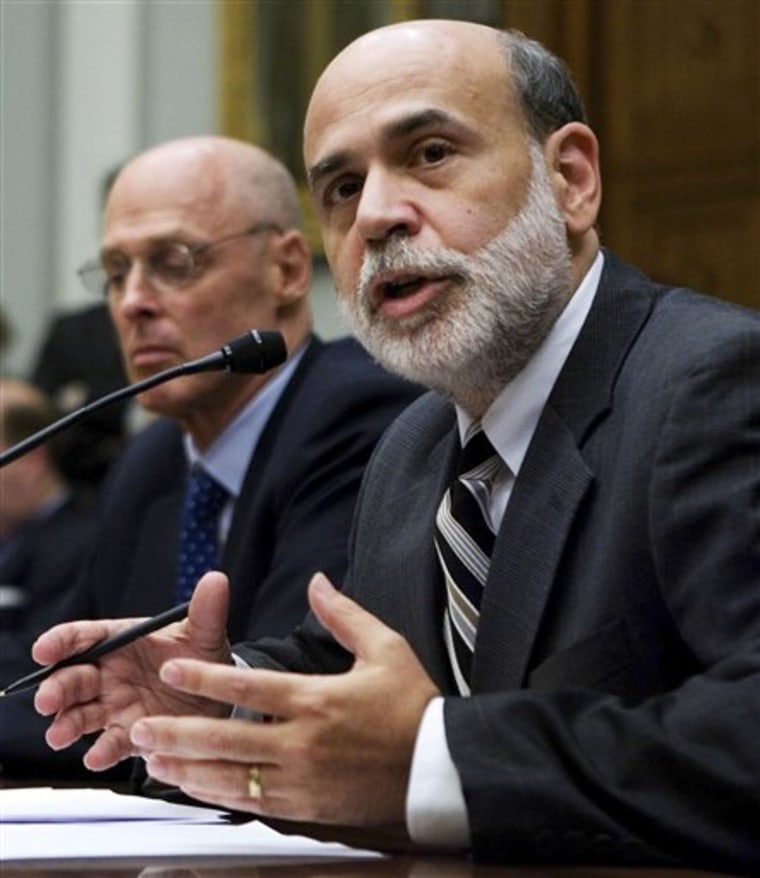Bernanke and politics — oil and water.
Before he took over the Federal Reserve, Ben Bernanke told Congress he wanted to steer clear of politics.
More than two years later, he's knee deep in political mud as the Bush administration scrambles to breathe new life into a multibillion financial bailout package on Capitol Hill.
In a series of high-stakes sessions over the past several weeks, Bernanke and Treasury Secretary Henry Paulson have sought to sell the administration's $700 billion rescue package to skeptical lawmakers. After the House's stunning defeat Monday of the measure, Bernanke and Paulson huddled in an emergency strategy session at the White House.
The worst financial crisis since the Great Depression has thrust Bernanke squarely into the political arena — championing in public appearances before TV cameras and closed-door meetings on Capitol Hill an unprecedented bailout that could put taxpayers on the hook for billions.
Bernanke's journey from wanting to remain above the political fray to drowning in it underscores the grave economic situation the country faces. The conundrum confronting Bernanke: How far can you go in trying to save the economy, while at the same time not hurting the Fed's independence?
"There is a very serious risk that the Fed compromises its independence with these moves, but I think the alternative is calamity," said Richard Yamarone, economist at Argus Research.
Storied Wall Street institutions and banks have been laid low. Unemployment is at a five-year high. As it becomes harder and more costly for individuals and companies to borrow money, the economy is in danger of jolting into reverse, Bernanke warned.
A sober-faced Bernanke, a scholar of the Great Depression, told hostile lawmakers last week he wished the Fed — the lender of last resort — didn't have to be so deeply involved. "The Federal Reserve would like to get out of dealing with some of these crises we've been dealing with ... and we prefer to get back to monetary policy, which is our function, our key mission."
To that end, the Fed in June halted an aggressive rate-cutting campaign to shore up the economy out of fears those lower rates were aggravating inflation. With the economy faltering, though, analysts believe the odds are growing that the Fed will reverse course and reduce rates again.
For now, the bailout blowup puts more pressure on the Fed to cut rates and take other steps — such as expanding its 1930s-era emergency lending powers or making even more cash loans available to strapped banks — to cut through the dangerous credit clog and get lending flowing more freely again.
The credit crisis also has forced Bernanke — who has been running the central bank since February 2006 — to take actions he wanted to avoid but couldn't without imperiling the country.
Shortly after the Fed in March took the unprecedented step of helping to bankroll JPMorgan Chase's takeover of investment house Bear Stearns, Bernanke told Congress it was meant as a one-time event. "It has never happened before, and I hope it never happens again," he said.
At the time it took the Bear Stearns action, the Fed also opened its emergency lending program to investment firms, fearing they could all go down. (One by one the remaining firms did disappear — either filing for bankruptcy, merging or converting themselves into banks.)
Just six months after the Bear Stearns debacle, the Fed ended up endorsing the government's historic seizure of mortgage titans Fannie Mae and Freddie Mac, providing a staggering $85 billion loan to insurance giant American International Group and helping Paulson hatch the massive financial bailout package.
The bailout plan was intended to thaw frozen credit markets by buying billions upon billions of rotten mortgage-related assets held by banks and other financial institutions so that they would lend money more freely again. Congressional leaders raced Tuesday to find out what changes are needed to sell the failed package to rank-and-file members.
In the fall of 2005, Bernanke, then Bush's chief economic adviser, pledged to run the Fed independent of political influences during a Senate hearing on his nomination after Alan Greenspan retired.
"I assure this committee that, if I am confirmed, I will be strictly independent of all political influences and will be guided solely by the Federal Reserve's mandate from Congress and by the public interest," Bernanke told the Senate Banking Committee at that time.
Bernanke also suggested to lawmakers that he wanted to steer clear of weighing in on specific hot-button legislative proposals, such as those dealing with taxes and spending. "I'm going to begin now, I think, a practice of not making recommendations on specific tax or spending proposals," he told lawmakers during the confirmation process. That stood in sharp contrast to Greenspan, whose support of President Bush's call for massive tax cuts in 2001 infuriated many Democrats.
These days critics — including academics, lawmakers and economists — worry that the Fed's expanded role during the crisis is not only putting taxpayers at risk but also encourages "moral hazard" — that is, allowing financial companies to gamble more recklessly in the future.
At a Fed conference in August, Thomas Hoenig, president of the Federal Reserve Bank of Kansas City, gave Bernanke a white hard hat — like those worn by construction workers — in case he needed protection from critics during the sessions.
One of those critics, Willem Buiter, professor of European political economy at the London School of Economics and Political Science, complained that the Fed listens too much to Wall Street.
